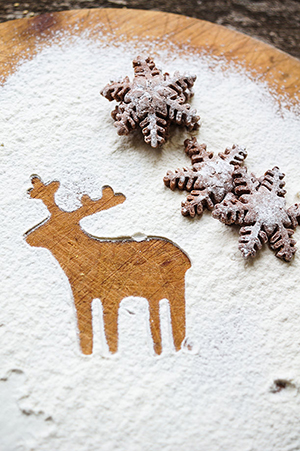As seen in Charm East Texas
Holiday baking brings so much joy.  There is nothing quite like that first taste of cinnamon- and nutmeg-scented pumpkin pie each year. Every family seems to have a tradition that revolves around some sort of holiday baked good, even if it’s just “Mama bakes ’em and we eat ’em”.
There is nothing quite like that first taste of cinnamon- and nutmeg-scented pumpkin pie each year. Every family seems to have a tradition that revolves around some sort of holiday baked good, even if it’s just “Mama bakes ’em and we eat ’em”.
Cookies, gingerbread houses and Christmas candy all have a common denominator — sugar. We all know we need to eat less sugar, but the holidays are the hardest time to achieve that goal. Even though it is important to eat less added sugar, there are some natural sweetener options available for baking that have what I like to call “intrinsic benefit.” If you’re going to eat sweets anyway, at least choose a sweetener that has some sort of benefit built in, like antioxidants, minerals or a lower glycemic index. Don’t get me wrong, these sweeteners are still sugar, so they will increase your blood sugar and have plenty of calories, but used judiciously, naturally sweetened baked goods can be a lovely addition to your holiday baking spread. Here’s some options to add to your pantry.
Cane sugar
Most of the refined sugar sold at the grocery store is beet sugar. Sugar beets are a GMO crop, so people who would like to avoid eating GMOs should choose cane sugar, which is never GMO. Organic cane sugar will be free of pesticides and other contaminants. Cane sugar has a slight molasses flavor and smell but can be used one-for-one in recipes that call for regular sugar. Cane sugar is nutritionally almost exactly the same as regular refined sugar. Turbinado (also known as Sugar in the Raw) is similar to regular cane sugar, but it is more coarse in texture and has a little more molasses added back to it for flavor. Because it is coarse, it can’t be used as a direct substitute for sugar.
Sucanat
Sucanat is a special type of unrefined cane sugar made by beating cane juice with paddles to form gold-brown granules. It resembles brown sugar in appearance, but it is not the same thing since brown sugar is simply regular refined sugar with molasses added to it. Sucanat has a deep molasses flavor because it retains all of the molasses naturally found in cane juice, which enriches the sugar with vitamin B6 and minerals like calcium, iron, magnesium, potassium and selenium. It can be used one-for-one (preferably measured by weight instead of volume) in recipes that call for sugar, but it first needs to be ground in a spice grinder for about one minute until it is fine and powdery so as not to alter the texture of baked goods. Products baked with Sucanat will be a slightly darker color.
Coconut sugar
Coconut sugar is a flavorful sugar option that is available now at most grocery stores. It is made from the sap of coconut palm flowers, which is boiled down to make granules. It has a subtle nutty aroma which works well in most baked goods. Similar to Sucanat, it can be used one-for-one in place of regular sugar in recipes, but because it has irregularly sized granules, it should be ground in a spice grinder for about a minute prior to measuring. There isn’t a lot of information on the nutritional content of coconut sugar, but it likely retains some of the nutrients available in the coconut plant, like vitamin C and several minerals. It is believed to have a lower glycemic index than refined sugar, but it still has the same amount of carbohydrates and calories as refined sugar.
Honey
I’ve opined about the heavenly origins of honey and its many health benefits in a previous issue. Honey is rich with enzymes, vitamins, minerals and even live bacteria that are all beneficial. Honey can be used in baking if the recipe calls for it specifically, or it can be substituted for corn syrup. However, honey doesn’t work well for candy making because it is chemically different from corn syrup.
Maple syrup
Maple syrup is the neatest thing ever. Tap a hole in a maple tree, let the sap drip out, boil it down, and you’ve got maple syrup. It takes around 40 gallons of sap to make 1 gallon of maple syrup. Don’t confuse maple syrup with pancake syrup, which is just sugar syrup with artificial flavoring. Aunt Jemima ain’t got nothin’ on the real thing. Maple syrup is great in baked goods because of its distinctive flavor. Use maple syrup in place of corn syrup in your pecan pie this season. The pie will have a slightly looser texture, but the flavor will be off the charts. Look for recipes like maple cake and other delicious ideas for baking with maple syrup. Maple syrup is rich in riboflavin, minerals and antioxidants. Grade B syrup (which is not inferior quality, just stronger tasting) has even more healthy minerals than Grade A, so I prefer to use Grade B when I can find it.
Date sugar
Date sugar is an interesting product made by grinding dried dates into a powder. Its properties are completely different from regular sugar since it is actually dried fruit, not pure sugar, so it won’t work as a substitute in normal baking applications. It should be used in recipes specifically designed for date sugar like date-nut bread. Date sugar is rich in antioxidants, B vitamins, minerals and fiber.
Another option often employed in holiday baking, especially for those dealing with diabetes, are artificial sweeteners and reduced-sugar products. Artificial sweeteners are a complicated topic, but my usual advice is that they are probably safe if eaten occasionally and in small amounts. That being said, I don’t recommend Splenda (sucralose) because there is some preliminary research indicating that it may have a harmful effect on gut bacteria and insulin response. Sugar alcohols and stevia are probably the safest low-calorie sweeteners available. (Sugar alcohols can cause gas and bloating if used in excess.) The myriad other options in colorful little packages on your restaurant table are probably safe, but I generally recommend practicing the precautionary principle when determining whether a relatively new and artificial substance in the food supply can cause harm. If in doubt, err on the safe side and stick with the most natural products available.
Get adventurous and try your hand at baking with some of the delicious and flavorful natural sweeteners available for some special holiday treats this year. And remember, enjoy the holidays and don’t feel obligated to undertake a major New Year’s resolution after it’s all over. Choose to eat mindfully throughout the holidays. Take the time to savor each bite slowly, listen to your hunger and satiety signals (no, really, the leftovers will be there later), and remember that the only reason the food is extra special is the people with whom you are sharing it. May you savor each bite and each moment this holiday season.
Try out some of these great products and brands at your local store. Speak to your Store Director and Shop Brookshire Brothers Brands here.
Merry Christmas!
 Angela Larson is a registered dietitian (RD) who works with Brookshire Brothers promoting real fresh, real delicious healthy foods and providing nutrition education to the community. She is also a clinical dietitian representing Woodland Heights Medical Center in Lufkin where she does community education on food and nutrition. Food is her passion, so Angela loves trying new recipes and exploring the more holistic side of nutrition. Angela loves to cook, garden, and spend time outdoors. Look for Angela's monthly articles in Charm East Texas.
Angela Larson is a registered dietitian (RD) who works with Brookshire Brothers promoting real fresh, real delicious healthy foods and providing nutrition education to the community. She is also a clinical dietitian representing Woodland Heights Medical Center in Lufkin where she does community education on food and nutrition. Food is her passion, so Angela loves trying new recipes and exploring the more holistic side of nutrition. Angela loves to cook, garden, and spend time outdoors. Look for Angela's monthly articles in Charm East Texas.
